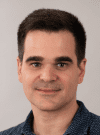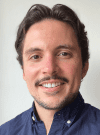For Immediate Release: Wednesday, August 18, 2021, 10:00 a.m. U.S. Eastern Time
Media Contact: Kara Flynn, 202-257-8424 press@ashg.org
ASHG in partnership with NHGRI, Biogen, GSK, Roche, and Merck Sharp & Dohme (MSD) are pleased to recognize this year’s Scholars. The Human Genetics Scholars Initiative was developed to help advance diversity and inclusion in the human genetics research workforce.
Meet the 2021-2023 Human Genetic Scholars

C. Eduardo Guerra Amorim, PhD, is an Assistant Professor of Biology at Cal State Northridge. His research focuses on leveraging genetic diversity from present-day and ancient human individuals to learn about population history, adaptation, and disease. Dr. Amorim’s academic background includes postdoctoral training at Columbia University, Stony Brook University, UCLA, and the University of Lausanne, and a Ph.D. from the Federal University of Rio Grande do Sul, Brazil. His current research centers on developing approaches to characterize natural selection in humans using ancient DNA. Dr. Amorim is an advocate for diversity and inclusion in STEM and has worked for promoting the visibility of underrepresented scholars and individuals from historically marginalized groups.

Ky’Era Actkins, BS, obtained her Bachelor of Science in Biology at the University of Alabama and is currently a Doctoral Candidate at Meharry Medical College where her research interests include understanding health disparities in women’s health conditions. Under the mentorship of Dr. Lea Davis at Vanderbilt University Medical Center, her thesis work uses computational and statistical genetic methods to characterize genetic and environmental risk factors of polycystic ovary syndrome in diverse populations. Ky’Era is also a recipient of the Ruth L. Kirschstein Pre-Doctoral National Research Service Award.

Lesley Chapman, PhD, is a postdoctoral fellow at the National Cancer Institute. She obtained her Ph.D. from the University of Rochester Medical Center where she studied the effects of microRNAs on mediating the host immune response. Dr. Chapman is currently leading an effort to identify rare non-coding variants that are associated with cancer risk in a cohort of childhood cancer survivors using machine learning based strategies. She is a fellow within the NCI Intramural Continuing Umbrella of Research Experiences (iCURE) Program, and is actively involved in the mentorship of underrepresented minorities within cancer research.

Gretchen Johnson, MS, MA, is a PhD candidate in Biology at Howard University. Her dissertation investigates the genomic origins and diversity in the human skeletal remains of mid-19th century Liberated Africans, a forgotten population of the transatlantic slave trade discovered on remote St. Helena Island. Gretchen conducted a six-month field research on St. Helena for her dissertation. During her fieldwork, she stimulated an island-wide interest in genetics and ancient DNA research among the diverse St. Helenian population, and created interdisciplinary research opportunities for St. Helena’s School System. As a National Geographic Explorer, Gretchen was selected as a National Geographic Early Career Leader, and AAUW Fellow based on her pioneering field research work on St. Helena. Gretchen earned her Master of Science degrees in Biomedical Forensic Science, and in Medical Science from Boston University School of Medicine; Bachelor of Science degree in Biology from Rensselaer Polytechnic Institute.

Juan Del Toro, PhD, is a Research Associate at the Learning Research and Development Center at the University of Pittsburgh. Dr. Del Toro received his Ph.D. in Developmental Psychology with a concentration in Advanced Quantitative Analyses from New York University. As an applied psychologist, Dr. Del Toro takes a multi-method, multidisciplinary, and collaborative approach to investigate: (1) why distinguishing between perpetrators of racial discrimination matters for child development, (2) what are the direct and intergenerational consequences of involvement in the criminal justice system, and (3) what are opportunities that peers, educators, and families can leverage to reduce the negative effects of unwarranted involvement in the criminal justice system on children’s developmental competencies. This work has resulted in first-authored publications in Child Development, American Psychologist, and Proceedings of the National Academies of Sciences (PNAS) and has garnered support from the National Institutes of Health and the Spencer Foundation.

Ricardo Harripaul, PhD, is currently a research fellow at Massachusetts General Hospital/Harvard Medical School and combines multidisciplinary training in bioinformatics and human genetics to identify and characterize novel genes in neurological disorders. His thesis work at the University of Toronto identified the role autosomal recessive variants play in neurodevelopmental disorders including Autism Spectrum Disorders, Intellectual Disability and Bipolar Disorder. Dr. Harripaul has identified over 40 novel genes for ID and contributed to the discovery of Inborn Errors of Metabolism in hard-to-treat psychiatric patients. Dr. Harripaul is currently investigating how splicing defects affect expression in neurological disorders. He is also very passionate about teaching and has taught many workshops on computational biology to general and graduate-level audiences. Dr. Harripaul is an advocate for teaching disadvantaged populations and has also taught special needs children at Grandview Children’s Centre for over a decade.

Nathan Nakatsuka (kānaka maoli), PhD, was born and raised in Honolulu, Hawaii. He graduated from Kamehameha Schools Kapālama High School then attended Harvard College, earning an AB in Chemical and Physical Biology. He then attained an MPhil in Genetics from University of Cambridge on a Gates Cambridge scholarship, working at the Wellcome Trust Sanger Institute with Inês Barroso. Nathan is currently an MD/PhD student at Harvard Medical School in the Harvard-MIT Health, Sciences, and Technology MD track. He received his PhD from the Systems, Synthetic, and Quantitative Biology PhD program working in the laboratory of David Reich on population genetics of South Asia and the Americas with relevance for human health.

Calandra Whitted, DrPH, is a postdoctoral fellow at the National Human Genome Research Institute in the Social and Behavioral Research Branch. She obtained a Doctor of Public Health degree in Behavioral Sciences and Health Education from Florida Agricultural and Mechanical University, College of Pharmacy and Pharmaceutical Sciences, Institute of Public Health and the National Institutes of Health Graduate Partnership Program where her dissertation focused on health disparities in genomics education. Dr. Whitted performs research in the field of social and behavioral genomics. She is currently leading a project to help Black individuals and families understand how to assess risk of heritable diseases using family health history tools with the aim of improving communication and generational family health. She is an advocate for mentoring underrepresented students and developing strategies to support scientists of diverse backgrounds.
- Identifies, mentors, and helps prepare a select group of high-potential, diverse early-career individuals for professional success.
- Develops and sustains a community of researchers across generations committed to diversity and inclusion, who are willing to foster sustained attention to these issues in their research institutions and training programs.
***
About the American Society of Human Genetics (ASHG)
Founded in 1948, the American Society of Human Genetics is the primary professional membership organization for human genetics specialists worldwide. Its nearly 8,000 members include researchers, academicians, clinicians, laboratory practice professionals, genetic counselors, nurses, and others with an interest in human genetics. The Society serves scientists, health professionals, and the public by providing forums to: (1) share research results through the ASHG Annual Meeting and in The American Journal of Human Genetics; (2) advance genetic research by advocating for research support; (3) educate current and future genetics professionals, health care providers, advocates, policymakers, educators, students, and the public about all aspects of human genetics; and (4) promote genetic services and support responsible social and scientific policies. For more information, visit: http://new.ashg.org.
6120 Executive Blvd, Suite 500 | Rockville, MD 20852 | 301.634.7300 | society@ashg.org | new.ashg.org
Connect with ASHG on Twitter (@GeneticsSociety) | Facebook | LinkedIn
